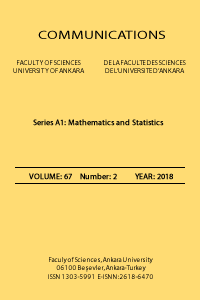Change-constrained stochastic programming problem with normal, t and skew normal, skew t distributions
In this paper, a change constrained optimization programming problem is studied under the assumption that the model coe¢ cients in the inequalities defned as random variables are independent and assumed to be Normal, t; Non Normal Skew distributions; Skew Normal and Skew t distributions. The Hulkursar method transform the stochastic programming problem into a non-linear deterministic problem is used in the study. The most common distribution in CCSP is the Normal Distribution; but the real world problems always may not include normality.Therefore; in the practice stage, an application that the aij technologic coefficient and the bi right side values in the inequalities have both Normal, t; Skew Normal and Skew t distributions is given. Finally the obtained results have been compared.
Keywords:
Change Constrained Stochastic Programming, Skewness, Skew Normal Distribution Skew t Distribution,
___
- Azzalini, A., A class of distributions which includes the normal ones, Scandinavian Journal of Statistics,12 (1985), 171–178.
- Azzalini, A., Further results on a class of distributions which includes the normal ones. Statistica, 46(2) (1986), 199-208.
- Azzalini, A and Capitanio, A, Distributions generated by perturbation of symmetry wtih emphasis on a multivariate skew t distribution, Journal of the Royal Statistical Society, Series B ( Statistical Methodology), 65(2) (2003), 367-389.
- Azzalini, A., The skew-normal distribution and related multivariate families (with discussion), Scandinavian Journal of Statistics, 32 (2005),159–188.
- Arslan, O., A review on the univariate skew t-distributions, Far EAST Journal of Theoretical Statistics 34(1) (2011),17-34.
- Atalay,K. and Apaydin,A., Gamma distribution approach in change-constrained stochastic programming model, Journal of Inequalities and Applications 1(108) (2011) , 3-13.
- Azzalini, A.,The Skew Normal and related families. Cambridge University Press, (2014).
- Charnes, A. and Cooper, W.W., Chance constrained programming, Management Science, 6 (1959), 73- 79.
- Gupta, A.K., Chang, F.C. and Huang, W.C., Some skew symmetric models, Random Operators and Stochastic Equations, 10 (2) (2002), 133-140.
- Gupta, A.K., Multivariate skew t distributions, Statistics: A Journal of Theoretical and Applied Statistics, 37(4) (2003), 359-363.
- Hulsurkar et al., Fuzzy programming approach to multi-objective stochastic linear programming problems, Fuzzy Sets and Systems 88 (1997), 173-181.
- Stancu-Minasian, I.M. and Wets, M.J., A research bibliography in stochastic programming, Oper.Res. 24 (6) (1976), 955-1975.
- Lin, T.I., Lee, J.C. and Yen, S.Y. ,Finite mixture modelling using the skew normal distribution, Statistica Sinica, 17(3) (2007), 909-927.
- O’Hagan, A. and Leonard, T., Bayes estimation subject to uncertainty about parameter constraints, Biometrika,63(1) (1976), 201-203.
- Yılmaz, M., Edgeworth series pproximation for chi-square type chance constraints, Communications Faculty of Sciences University of Ankara Series A1, 56(2) (2007), 27–37.
- Yılmaz, M. Edgeworth series approximation for gamma type chance constraints, Selcuk Journal of Applied Mathematics, 10(1) (2009), 75–89.
- Yılmaz, M and Potas N., Solutions to change-constrained programming problems with exponential random variables by edgeworth approximatin, Chaos Complexity Leadership Springer Proceedings in Complexity. (2016),1-22.
- ISSN: 1303-5991
- Yayın Aralığı: Yılda 4 Sayı
- Başlangıç: 1948
- Yayıncı: Ankara Üniversitesi
